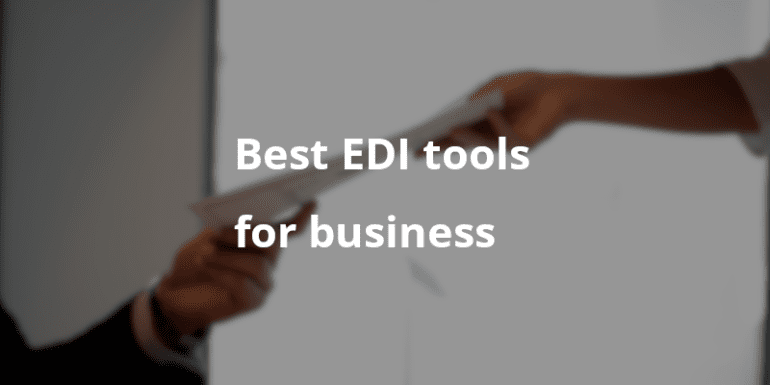7 Hottest EDI Tools for B2B eCommerce in 2023
Businesses are switching to an online format. People are trying to keep up with the times and provide other services to the digital environment. Electronic Data Interchange or EDI software is a great example of digitalization and globalization. EDI and eCommerce are closely related spheres since they are complementary technologies.
In this article we will go through the EDI tools, their benefits, and examples. We have looked through 30 EDI integration softwares and define the top EDI tools list with the most balanced solutions according to functionality-price ratio.
What is EDI in eCommerce?
EDI stands for Electronic Data Interchange. EDI in eCommerce is extremely important. This is a piece of software that helps businesses, especially B2B partners, automatically and quickly exchange business data: invoices, messages, purchase orders, confirmations, emails, and others. EDI data portal is a digital representation of paper documents of a company which have legal force. EDI ecommerce services serve to optimize document flow and fasten business processes.
What Types of EDI Software Exist?
EDI managing tools can be divided according to the way they are launched:
- Cloud-based—EDI tools of this type do not require downloading and can be used by signing up on a website of a certain company. Cloud-based EDI software is quite popular among small and medium-sized businesses. It can be deployed very quickly and usually, it is simpler and has a shorter learning curve. As a rule, EDI software companies don’t give you edi mapping tools open source code.
- On-premise—these ones should be downloaded and used via a local host. On-premise EDIs are more functional, powerful, and costly. They are suitable for large enterprises.
According to the number of available features and control stage, EDI monitoring tools can be divided in a more complex way:
- Peer-to-Peer EDI tools—EDI of this type connects directly two or several companies. It was the first form of EDI systems which today is considered obsolete.
- Web EDI or EDI via VAN—These two types are very similar. They are cloud-based solutions. The service is hosted by a provider. It is a flexible and user-friendly type of EDI system.
- EDI as a service— it can combine different types of platforms. The main feature here is that there is a specialist or a team which knows characteristics of various EDI tools in markets and can manage them effectively.
EDI translator and EDI mapping tools
EDI translation software is usually included in available features of an entire EDI. These two features are used to adapt different formats like txt, docx, and others to a unit way of representation. They convert EDI documents to a specific format for a certain company and back. Such formats are called EDI standards. An EDI translator allows for taking an original file and converting it to an EDI standard. Then it converts the EDI standard into a partner’s common format.

What are the Benefits of EDI Software?
EDI for ecommerce play an important role in eCommerce business and have considerable advantages:
- EDI tools save time and money—they fully automate data sharing between trading partners. EDI tools greatly simplify and boost data exchange between companies.
- Provide positive customer experience—Implementation of an EDI tool can also have a positive impact on the customer experience and relationships between the business parties. With EDI purchasers and sellers interact in a fast and convenient way with each other.
- High efficiency and productivity—since all the transactions are carried out automatically, it leads to less manual work and fewer mistakes. It allows for ensuring that information and data are formatted correctly before they enter business processes or applications.
- Eco-friendly method—not only is it a convenient way to run a business, but also it is a sustainable way to store data. The more humanity develops, the worse is ecology. It is high time people thought about switching to a digital format.
- Possibility to integrate other systems—EDI integration streamlines document tracking and reporting as electronic systems can be integrated with a variety of IT systems to organize data collection, visibility, and analysis.
Who Uses EDI Software?
There are a lot of companies that use EDI data portals:
- Companies that frequently use internal documents
- Big companies which have a lot of offices and departments
- Companies that have switched to a remote mode of operation
Whether it is needed for small businesses?
Actually, there is no right answer. It fully depends on a business type. The more documents you have, the less efficient the manual work. The necessity of such a solution increases. Furthermore, adopting EDI softwares allows for partnership with big companies.
EDI b2b integration is a wide-spread solution but whether there is an EDI tool for small business? Indeed, it is challenging to define the best EDI for small business but some of EDI softwares below are suitable for smaller companies as well.
EDI software trends
Let’s turn to EDI tools comparison. There are great solutions represented by EDI b2b platforms. We know that there are a lot of questions on small businesses. Despite the fact that in this article we are mostly focused on big businesses, since this technology is usually implemented to develop enterprises, we decided to include some EDI which might be suitable for small business, too.
1. Adeptia Connect

Adeptia was founded by a small team of IT enthusiasts in 2000 in the United States. Adeptia’s next-generation EDI software automates business data transactions and speeds up customer and supplier data onboarding by up to 80% using a self-service, citizen integrator approach.
The main feature of this EDI b2b integration is that it doesn’t require heavy IT labor to set up and maintain business data exchange—everything is centralized in the cloud and non-tech-savvy employees can easily use it for quick data exchange for better decision-making and improved business agility.
In addition, it allows users to use self-service portals to onboard themselves for improving onboarding, reducing manual data entry, and expediting order processing.
The feature set of Adeptia Connect is quite rich but all the functionality is easy to use and doesn’t require special technical skill or IT support:
- Easy for non-technical users. Adeptia’s interface and logic are designed in the way that anyone who is familiar with web applications can master Adeptia’s integration application in an hour.
- Collaboration portal for internal and external users. Your employees, customers, and suppliers—all of them work in the same interface. They all see the same thing and can easily collaborate on data connections.
- Customer and supplier portal. You can provide your partners with access to a unified portal where they can see all the information about connections and available options. No need to develop proprietary portals for external partners.
- Shared templates. Adeptia Connect offers pre-defined templates for specific business information. For example, you can share order, invoice, inventory information, shipping information, leads, and other templates with your partners.
- Integration with third-party applications. Adeptia Connect integrates with popular eCommerce platforms, Salesforce, Quickbooks, Dropbox, Google Drive, and many other apps.
- Transaction configuration wizard. You can easily configure transactions with other companies and cloud apps.
- Access on-premise data. Adeptia is deployed locally on the company’s servers behind the firewall and connects to local applications and databases.
- Other cool features and capabilities include ETL, EDI, B2Bi, EAI, ESB, Hybrid integration, large file data ingestion, messaging, AI-powered data mapping, support of various data formats, and protocols, triggers and events, and others.
Adeptia EDI tool offers 3 pricing plans for mid-sized businesses and enterprises. They also offer custom pricing depending on the business requirements. Users rate Adeptia at 4.5 out of 5 stars.
2. TEE (The EDI Exchange)

The EDI Exchange is an EDI tool developed by a small team of highly experienced developers in the United States. They have over 20 years of experience in completing integrations ranging from shipping, ERP, E-Commerce related projects accounting, and many more. The company offers a simple yet efficient EDI tool with 24/7 technical support and a personal account manager.
Besides the essential features of a proper EDI tool, EDI Exchange has some extra advantages:
- Integration with major trading partners such as Amazon, Ford, Acosta, Walmart, Georgia-Pacific, and others.
- Support of all major industries such as retail, automotive, pharmaceutical, grocery, transportation, and logistics.
- Integrations with third-party applications such as NetSuite, Salesforce, Quickbooks, ShipStation, and others.
- Fast setup. The team of highly experienced specialists takes over all the technical aspects of the implementation and maintenance of the system.
- Data security. The EDI Exchange security algorithms continuously monitor the data transaction process.
- No hidden prices. TEE says their prices are low compared to competitors and the pricing is transparent.
The company doesn’t publish prices but states they are super affordable. Based on this information and the features, we can say that TEE is one of the best EDI for small business that don’t need excessive functionality. It is abealing for its simplicity and affordability.
3. Arcesb
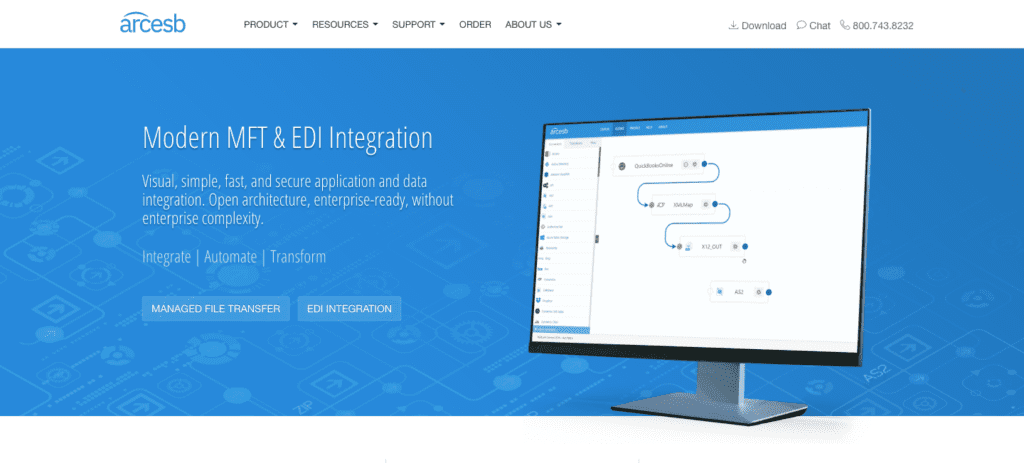
Arcesb EDI software started in 2005 in the United States. The company offers a complete and easy to use EDI solution that is available both on-premise and in the cloud. The key advantage of Arcesb is its code-free visual interface. No need for special skills to set up and use this EDI tool.
Arcesb is the most feature-rich EDI software on our list. The functionality is truly impressive:
- Supports all major EDI formats and all the existing document formats and protocols.
- Automation of the integration with third-party business applications such as CRM, ERP, marketing, finance, analytics, and other apps.
- A visual and easy-to-use interface that allows for data drag and drop transfer.
- EDI mapping and translation: map 10k+ EDI documents in 14 EDI standard formats to and from 100+ platforms.
- Managed file transfer: EDI managed file transfer involves sending EDI documents via secure, standard file transmission protocols.
- Cloud-ready: Moving on-premise servers to Azure or AWS can reduce the operational costs of managing infrastructure, increase availability with the ability to specify multiple nodes per cluster, and deliver rapid scalability.
- Best-in-class encryption and compression of the data: OpenPGP, AES, Zip, Jar, GZip, and more.
- Powerful API: The developer API allows you to easily integrate ArcESB into your internal processes or embed connectors into your product offering.
- Security: includes standard enterprise-class security features, such as TLS/ SSL data encryption for all client-server communications.
Arcesb pricing starts at $499 month/user and it is free for a single trading partner. Users rate Arcesb at 4.5 out of 5 stars.
4. Intertrade
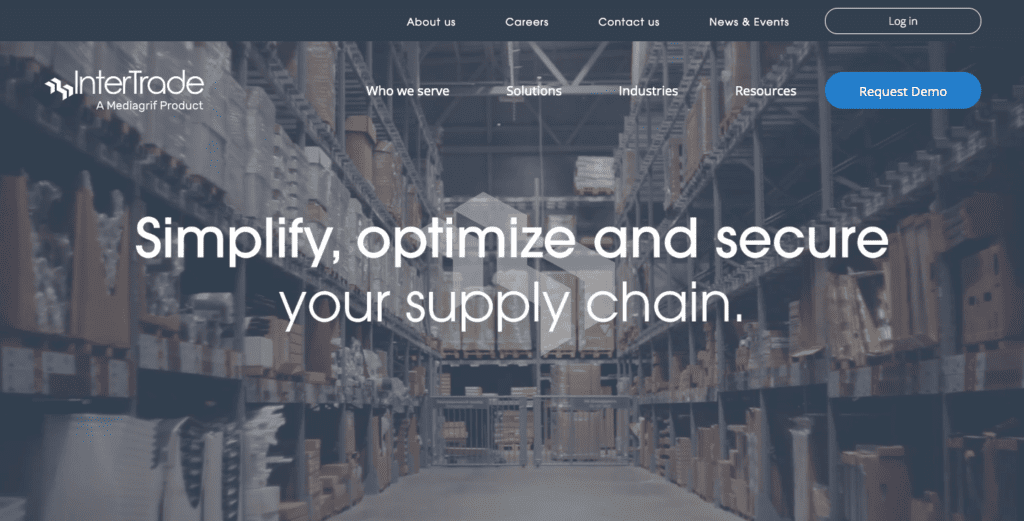
InterTrade is the U.S. EDI provider that has been optimizing and improving retailers’ and suppliers’ supply chain for 25 years. The company was founded in 1996 in Silicon Valley and in 2004-2007 they launched web EDI. They offer EDI for retail, food, healthcare, and automotive. Dillard’s, Bonduelle, and BRP are among their customers.
InterTrade is a cloud EDI solution, which means you can easily access the system through your browser from anywhere.
The feature set is standard for a quality EDI tool: EDI testing tools, document archiving, EDI mapping tool, and others. Intertrade has everything you need to organize an effective business data interchange. There are some advantages we’d like to highlight:
- Seamless direct EDI. You can easily access the system via browser from any device and any location.
- Accelerated data flow. Transfer product information, purchase orders, invoices, and other important data hassle-free and securely.
- Data errors check. The algorithms help you catch data errors before the transmission.
- Quality customer service. The company promises to deliver industry-leading customer service experience.
The vendor doesn’t publish the pricing information. You can request a free demo or contact them directly to find out about the individual price for your business. The solution is suitable for mid-sized companies and enterprises. Users love InterTrade and rate it at 4.7 out of 5.
5. Infocon

Infocon EDI was founded in 1988 in the United States. They offer a powerful cloud-based EDI system that is perfect for big companies and enterprises. They also develop EDI solutions from scratch for integrating with any trading partner and any industry.
Infocon EDI focuses on developing systems based on company requirements. Their solutions support all the must-have features of a proper EDI software such as document archiving, EDI testing tools, reports and analytics, EDI mapping tools, third-party integrations, and more. We’re highlighting the key advantages of Infocon systems here:
- Any trading partner: the solution allows you to exchange business data with any trading partner.
- Any business application integration: Infocon will integrate with your favorite ERP, CRM, accounting, and other software.
- Any industry: they can adapt their EDI solution to any industry—automotive, retail, healthcare, food, and any other.
- Great customer service: Infocon offers 24/7/365 customer support.
- Fast setup: the Infocon team takes over all the technical headaches—they can make any business EDI-compliant.
The vendor doesn’t show prices to the public because they are very individual. You need to contact them to know how much it will cost you to make your business EDI-compliant. This EDI solution is suitable for big companies and enterprises. User rate Infocon EDI at 5 stars.
6. Celigo Integrator
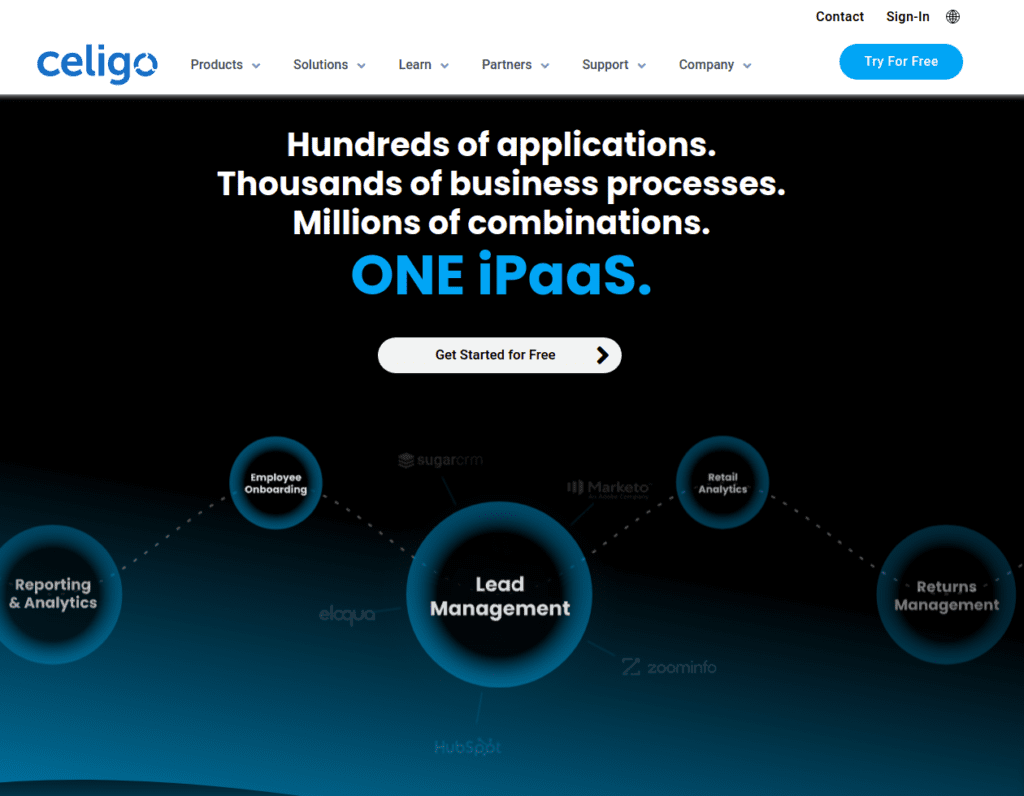
Celigo EDI software is a young integration Platform-as-a-Service (iPaaS) platform which was founded in the United States in 2011. It was named a G2 Best Software for 2021. Today it is one of the most popular platforms which is focused on middle-sized businesses and can suit smaller ones. In general, their services can be described as user-friendly, since they care about client side services a lot.
The main features are:
- Support. This EDI software has many supportive possibilities via help desk, email, and community.
- A lot of instructions. They have a wide range of different types of instructions on how to use their EDI tool: documentation, videos, online and offline meetings, and personal consultations.
- Easy to start. Since it is a cloud-based EDI software it can be launched fast and managing issues are provided by the platform.
There is no pricing on their website but if you like this EDI software you can write in support to describe your business model and get a price. Its rate is 4.7 out of 5.
7. MuleSoft Anypoint platform
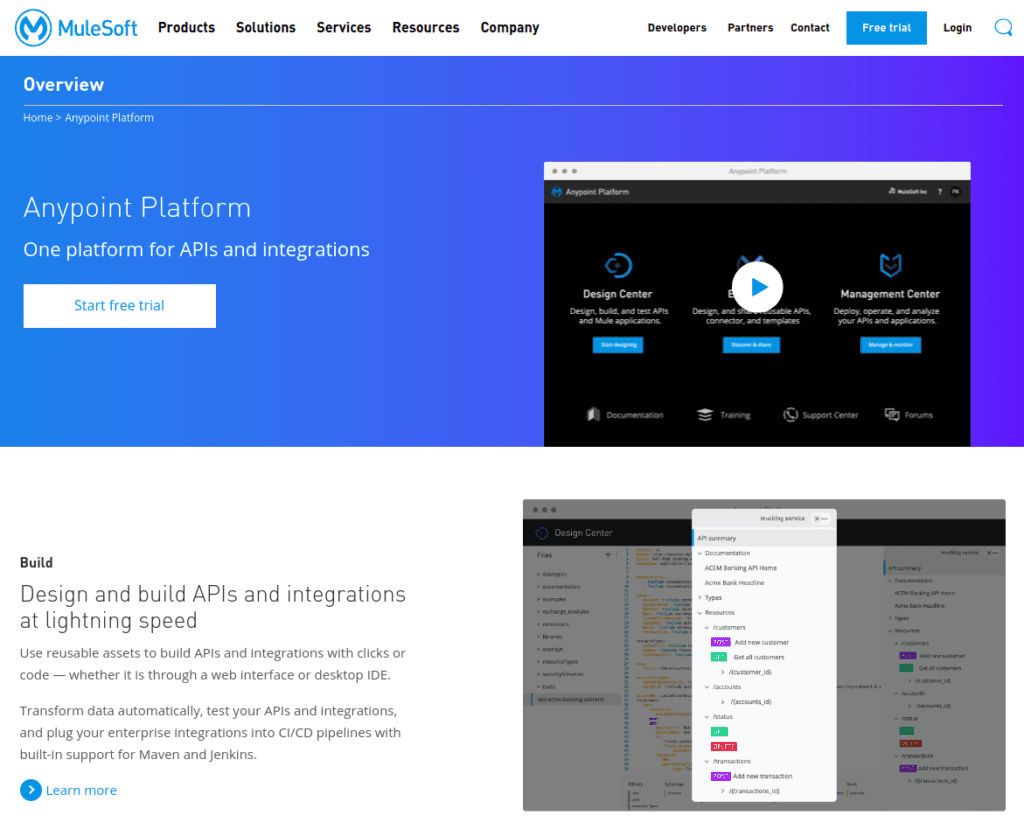
This EDI software is a part of the Salesforce company. Nowadays it is a part of the Salesforce Integrated cloud and vice versa Mulesoft has a built-in connector. It can be used as an EDI eCommerce tool, for enterprises, cloud-based businesses. The company promise that their clients have:
- Fast start. The company claims that users will have no problems with launching their system.
- Resilient operations. Reliable microservices suitable for scaling are built-in.
- User-friendly. The EDI platform is easy to understand and manage.
- Automated security. Security and governance by default.
- Powerful API. API management tools and integrations are fast and can be performed easily.
The company permanently develops and provides more convenient services, so its rate is 4.4 out of 5.
Summary
In eCommerce EDI is an important integrative system. EDI b2b integration is an indispensable tool. For small businesses it is an optional system. Adeptia Connect and Infocon systems are suitable for big players and for middle and small ones you can try Celigo Integration or TEE. However, it is better to contact the customer service of a certain company and consult to realize whether their product fits you. Advanced EDI softwares are indispensable for controlling documents flow and managing big businesses in general.
Yan Anderson is the Head of Content Marketing at CS-Cart with over 10 years of experience in the eCommerce industry. He's passionate about explaining complicated things in simple terms. Yan has expertise in building, running and growing eCommerce marketplaces. He loves to educate people about best practices, new technologies, and trends in the global eCommerce industry.
